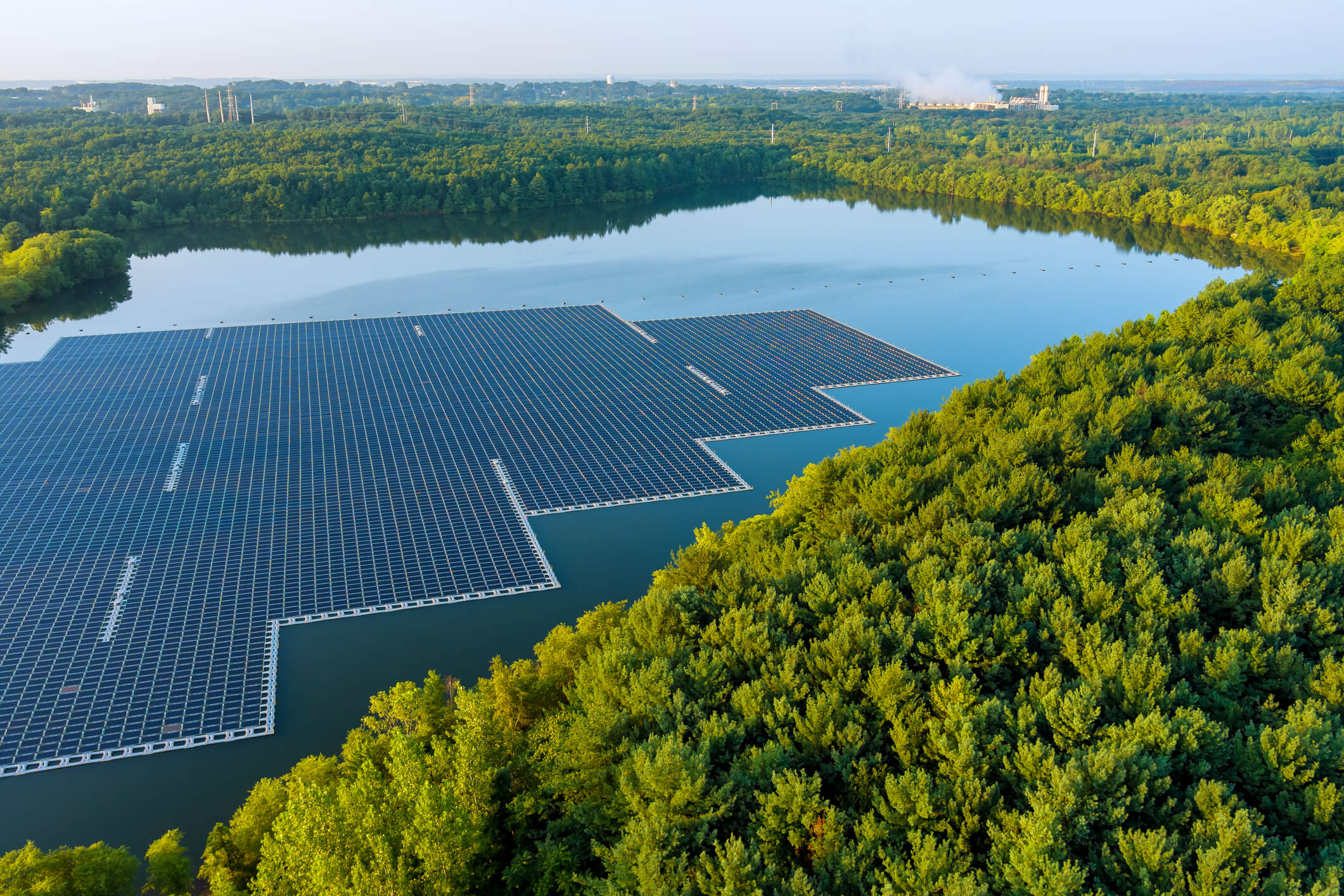What's next for energy innovation? A look into the future for UK SMEs
The net zero target of reducing emissions by 100% from 1990 levels by 2050 is edging closer each year. But what are we actively doing about it as a nation?
In August 2022, the UK government pledged to invest 37m in funding for renewable energy innovation. This includes ramping up the use of sustainable biomass and technologies that could generate hydrogen from waste - even using plastics!
It’s clear there is a lot happening in energy innovation in the UK and around the world, but before we dive into it, let’s take a look at what energy innovation is and what it really means for UK small businesses.

30-second Summary
- Energy innovation refers to new technologies and ideas to produce, generate, and distribute energy sustainably, so we can address challenges like reducing fossil fuel usage to achieve government targets and improve our overall sustainability.
- New energy innovations include hybrid renewable systems, floating solar, geothermal projects, wave energy, AI energy management, and hydrogen and nuclear projects.
- The benefits of businesses adopting these technologies include better sustainability, potential long-term cost savings, a competitive edge and fulfilling social and environmental responsibilities.
- Some of the challenges include high investment costs, lack of expertise, operational disruptions, and uncertain payback periods.
- New technologies are expensive, instead, SMEs can adopt green practices by conducting energy audits and improving inefficiencies, using self-generated electricity, and looking into energy storage solutions.
What is energy innovation?
Energy innovation refers to the new emerging technologies and ideas around improving the way we produce, generate and distribute energy in a bid to become more sustainable and energy efficient.
Energy innovation is needed to address the challenges we face in the energy sector, such as reducing the use of fossil fuels to meet the UK’s net zero target. Researching and investing in new, renewable energy systems is one way we can help achieve this.
What does energy innovation mean for UK small businesses?
Innovation can mean anything from putting new procedures in place to promote energy-efficient working to installing biomass or solar panel systems to produce self-generated electricity.
Bringing innovation into your organisation doesn’t need to be groundbreaking, though, it could mean upgrading to energy-efficient lighting or using a waste management system to ensure you’re recycling all you can as a business.
What are some upcoming technologies and innovations within the energy sector?
If you've never heard of floating solar technology or hybrid renewable systems, they're some of the new energy innovations that are on the horizon. Here's all you need to know.
Hybrid renewable energy systems
As the name suggests, hybrid renewable energy systems are a hybrid approach of using two or more sources of renewable energy and combining them in hybrid installations.
In some cases, these can be linked up to energy storage systems so excess electricity can be stored away for later use during peak periods. This is especially useful for energy-intensive industries when high demand increases energy prices. This type of innovation works towards delivering more clean, green energy.
For example, a hybrid system could use solar panels to collect energy from the sun on bright days whilst also using micro-turbines to use kinetic energy on windy days. This hybrid approach provides a more stable source of renewable energy compared to a single source.
Geothermal energy
Geothermal energy refers to the heat that’s deep underground, near the earth’s core. Heat and steam from hot rocks are harnessed and turned into power above the earth’s surface.
The great thing about geothermal energy is that the earth absorbs heat from the sun daily - so it is unlikely to run out like traditional non-renewable sources of energy, such as coal and gas. That’s what makes it a great innovation as well as a low-carbon energy source.
Although not a new energy source, governments are now investing more in this type of energy because it’s a low-carbon option, and we have an abundance of continuous heat below the earth’s surface.
Read our detailed guide to learn more about geothermal energy and how small businesses can use it.
Floating solar plants
If we can have solar panels on land, why can’t we have them in water? Floating solar panels are just that. They can be placed on pools of water, like lakes or areas of the sea and are anchored with weights so they don’t float away.
And just like regular solar technology, they absorb sunlight and turn this into electricity. This type of innovation is great because it allows us to expand the use of solar without using up land space, something we clearly lack in the UK.
This technology is relatively new, in fact, the UK’s first floating solar installation was placed in 2014 at Sheeplands Farm, Berkshire. Floating solar systems could contribute a lot more power to the UK’s energy mix (the mix of energy we use to power up the nation).
Sounds great? Yes, but in reality, this technology is still emerging, meaning it’s costly, and not every business owner has the spare cash lying around to invest, which is one of its limitations.
Wave energy converters
Wave energy converters (WECs) are constructions made to convert the kinetic energy and potential energy of a moving ocean wave into electrical or mechanical energy. And because our seas are constant, they produce a clean, reliable supply that can operate 24/7, resulting in a continuous stream of energy.
The UK is actually seen as a world leader in wave energy technology because we have an abundance of blustery shores and marine resources at our disposal. Wave and tidal energy combined have the potential to meet up to 20% of the UK’s current electricity demand, making it a key part of our future energy supply.
There are many different types of wave energy converters. But they can be put into six categories based on their design.
- Point absorbers - These are floating devices that vertically move up and down with waves in the sea. The motion produced is converted into electrical energy using hydraulic systems or similar.
- Terminators - These are devices normally placed near a shore and capture the natural energy from waves as they come in and break. It mimics what happens on an actual beach and is very similar to the technology of hydroelectric dams.
- Attenuators - These are long, dual structures that move with the wave’s motion. They capture energy from the waves as they rotate in response to wave movement. Think of two floating barges that are joined in the middle.
- Oscillating wave chambers (OWCs) - These are devices normally placed on shallow sea beds. They use the rise and fall of water within the chamber to drive a column of air up and down. This turns a mini turbine to generate electricity.
- Oscillating Wave Surge - This type of technology uses the surging motion of ocean waves to move a pendulum arm flap that swings back and forth on a hinge to produce electricity. These devices are almost always completely submerged underwater and sometimes in dangerous breakwater areas. Rotating mass devices - These devices sit on top of the water and use an internal weight that allows the device to rotate with the sea motion, almost like a spinning top. Waves keep the device constantly moving, generating power to be used or stored.
AI-enabled energy management systems
Many energy management systems use AI and machine learning to analyse data on energy consumption, find patterns, make conclusions and provide recommendations to improve energy efficiency for buildings. They can also use AI to predict system failures and make sure businesses are more prepared in case disaster strikes. Businesses use these systems to help make changes to existing operations, saving money in the process.
Read more on how AI can help businesses become more energy efficient.
Producing projects
Although in the early stages, hydrogen is set to play a big part in meeting our net zero target, with the UK aiming to produce 10GW of low-carbon hydrogen production by 2030. Projects like the Net Zero Hydrogen Fund are currently in the funding stages and will likely lead to at-scale production of low-carbon hydrogen by 2025.
Organic waste is something we have a lot of in the UK, so using it as fuel for creating power makes sense. Treating waste, including plastics, to extract hydrogen to be used as power creates renewable hydrogen, a new source of energy we could use to power up the UK. Companies like H2e Power are leading the way in utilising this technology.
Nuclear
An old but controversial energy source, nuclear is likely to play a big role in the UK energy mix in the future, with the government's nuclear strategy aiming to deliver 16GW of nuclear by 2030. This would mean 12 new nuclear reactors at five sites across the country!
Nuclear is expensive and can be dangerous if waste is not contained properly. But it is ‘clean’ energy because it doesn’t produce carbon dioxide or other greenhouse gases, although it isn’t classed as a renewable energy source because it can’t be reused.
Programmes like Great British Nuclear are driving new nuclear projects, and the potential of nuclear is clear, we could meet a quarter of the UK’s total power demands with nuclear power alone!
What’s the impact of energy innovations on SMEs?
matter, but some of the rewards for doing so contribute to something much bigger. Here are some of the benefits of getting on board with new affordable energy innovations that are on the market:
- Environmental Sustainability - More and more small business owners are becoming aware of their carbon footprint and actively trying to reduce it. Getting on board with new energy innovations demonstrates corporate responsibility, which is attractive to environmentally friendly customers and potential investors.
- Cost Savings - Adopting new energy innovations could help small businesses reduce their energy bills. Alongside standard practices like changing to energy-efficient lightbulbs, businesses could go further by using energy management systems and renewable energy sources to cut down costs and improve profits.
- Competitive Edge - Getting ahead of the curve and getting involved with investing or in energy innovations can give businesses a competitive edge. Some energy-efficient processes could improve product quality, cut down on waste, and increase customer satisfaction. Doing this could make your business stand out over a competitor or even make you a market leader.
If you’re not convinced, a 2022 study found that green innovation encourages business owners to fulfil not only social and environmental responsibilities but also encourages them to achieve business targets.
Are there any challenges that SMEs might face when adopting these technologies?
Despite the many benefits, there are always some drawbacks when it comes to new technology, and new energy innovations are no different. Here are some of the potential drawbacks:
High investment costs
Like anything new and shiny, it usually comes with a hefty price tag. New technologies like floating solar panels are normally part of large-scale projects by big corporations, like the Queen Elizabeth II Reservoir by Lightsource BP, making them inaccessible to your average UK business owner.
To get around this, small businesses can make use of incentives. For example, Floating Solar UK mentions on its website, that it is looking for dormant water reservoirs. If you own one, you can rent it out and receive a free, floating solar installation as well as up to a 40% reduction on your energy bill.
Learn how to apply and view the full brochure here.
Lack of expertise
Small business owners who decide to get involved with emerging technologies may find it difficult because they lack the knowledge and expertise to get the job done. Let’s be honest, no one expects the average UK business owner to know how to install a hybrid energy system.
That’s why if you decide to investigate some of these technologies, it’s best to get an energy consultant on board to help you research, compare and install a system that gives you the results you want.
Operational disruptions
Adopting new systems and integrating them with existing systems can be tricky, and you may find disruptions to your business operations, which could be costly.
This might happen while you figure out the logistics of how to move to a hybrid system or integrate geothermal heat pumps or energy storage systems with what you currently have.
Again, if you can, hiring an expert or consultant is advisable to make sure these types of operational changes go smoothly.
Uncertain Payback Periods
Investing in new technology can be risky, not only for your operations but also because of initial costs. The idea behind renewable systems is that you earn your initial investment back after a certain period. But with emerging technologies like wave energy converters, these timeframes just aren’t clear as we don’t have the data yet.
This leaves business owners wondering when they will see their money back. It also creates hesitation for initial investment compared to tried and trusted renewable systems like traditional solar panel systems.
Are there any UK government policies that focus on ‘clean energy'?
The government has set out many UK policies in a bid to encourage ‘green living’ in the UK. These policies affect UK citizens but also businesses alike.
- Reach Net Zero by 2050 - Achieving net zero is about taking steps to remove the carbon dioxide (C02) we emit into the atmosphere to stop the build-up of greenhouse gases that cause the 'greenhouse gas effect'. Most businesses emit some carbon dioxide, but steps can be taken to reduce the amount, like adopting more energy-efficient practices.
- Decarbonise electricity by 2035 - The UK is committing to decarbonise the electricity system by 2035. To do this, they will make more use of green technologies like offshore wind, which aims to reduce the amount of fossil fuels we use.
- Carbon Capture Storage - Our government is investing £1 billion in state-of-the-art carbon capture storage by 2030. The idea is to rescue carbon through industrial processes to stop emissions from escaping into the air.
- Electric Vehicles (EV) - This policy plans to set out the rollout of electric vehicles fully in the UK. The production and sale of new petrol and diesel vehicles will end by 2030, and all new cars and vans will have zero emissions by 2035.
How can SMEs integrate energy innovations within their business?
There are many ways UK small business owners can use emerging technologies to improve green business practices within their own organisations. Let’s review some of the most common options:
- Carry out an energy audit: Reviewing your current energy usage to see how you can make improvements to existing operations is a great place to begin. If you need support, consider hiring an energy consultant or use energy management software to give you guidance and help you make changes.
- Upgrade to energy-efficient lighting: A quick fix that could save you some pounds - swap existing lightbulbs to LED ones which use less power and will last longer compared to traditional lightbulbs. You could even check the energy labels of your existing appliances, machinery or technology and upgrade to more energy-efficient versions. A rating of A will be the most efficient, and G, the least.
- Use self-generated electricity - Any type of business can invest in renewable energy systems for self-generated electricity to power the business. If you can afford to, you could invest in technology for small-scale systems like microturbines, solar, hydro or even biomass.
- Use energy storage solutions - If you already produce renewable energy, you can store any excess with an energy storage system. This option is great for energy-intensive businesses that have a high demand for energy during busy periods. Businesses can leverage battery energy storage systems to charge at off-peak hours, providing energy security and reliability during the workday.
How Bionic can support you
If you don’t feel you need to hire an energy consultant, you might just want to talk to a broker. At Bionic, we get to know your specific energy needs so we can advise on the right deals for your business. We work with some of the best business gas and business electricity suppliers and service thousands of businesses every year.
Start your comparison journey online by entering your postcode into the box on the right-hand side. Get in touch to compare business energy and become a Bionic business today.








